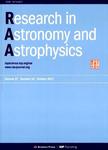A computational method to help identify and measure metallines in high resolution QSO spectra
A computational method to help identify and measure metallines in high resolution QSO spectra作者机构:Key Laboratory for Research in Galaxies and Cosmology Shanghai Astronomical ObservatoryChinese Academy of Sciences Shanghai 200030 China Center for Astrophysics and Space Sciences University of California San Diego La Jolla CA92093-0424 USA
出 版 物:《Research in Astronomy and Astrophysics》 (天文和天体物理学研究(英文版))
年 卷 期:2011年第11卷第11期
页 面:1279-1297页
核心收录:
学科分类:07[理学] 08[工学] 070401[理学-天体物理] 0803[工学-光学工程] 0704[理学-天文学]
基 金:supported in part by the US NSF grants AST0507717 and AST0808168 the National Natural Science Foundation of China(Grant No.10573028) the Key Project(No.10833005) the Group Innovation Project(No.10821302) the National Basic Research Program of China(973 Program No.2007CB815402)
主 题:methods data analysis-quasars absorption lines-quasars individual(HS0757+5218, Q0100+1300)
摘 要:A computational code is developed to help identify metal absorption lines in high resolution QSO spectra, especially in the Lyα forest. The input to the code includes a list of line central wavelengths, column densities and Doppler widths. The code then searches for candidate metal absorption systems and assesses the probability that each system could be real. The framework of the strategy we employ is described in detail and we discuss how to estimate the errors in line profile fitting that are essential to identification. A series of artificial spectra is constructed to calibrate the performance of the code. Due to the effects of blending and noise on Voigt profile fitting, the completeness of the identification depends on the column density of absorbers. For intermediate and strong artificial metal absorbers, more than 90% could be confirmed by the code. The results of applying the code to the real spectra of QSOs HS0757+5218 and Q0100+1300 are also presented.



